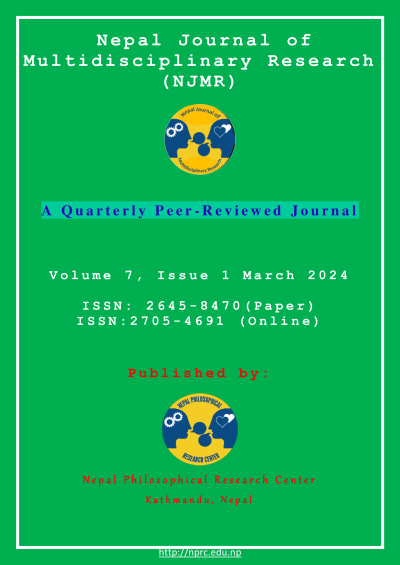Psychological Distress and Students’ Academic Achievement in the Colleges of Education: Does Gender Matter?
DOI:
https://doi.org/10.3126/njmr.v7i1.65245Keywords:
academic, achievement, anxiety, depression, stressAbstract
Background: Students are exposed to a wide range of potentially stressful situations which could negatively affect their academic achievement and their health. The study examined the influence of psychological distress on students’ academic achievement in the Colleges of Education (CoE) in Ghana.
Methods: Using descriptive cross-sectional survey design, 325 students were selected from six CoE using a multi-stage sampling procedure. Primary data was gathered using DASS-21 and analysed via SEM, Moderation analysis and independent sample t-test.
Results: The study discovered that psychological distress (i.e., depression, anxiety, and stress) negatively significantly predicted the academic achievement of college students. Specifically, academic anxiety and stress has a negative influence on students’ academic achievement. However, gender does not moderate the relationship between psychological distress and academic achievement of the students. There was a significant gender difference in the psychological distress of students. Female students experienced a high level of anxiety and stress compared to male students. There was no gender difference in depression among students.
Conclusion: School officials and teachers should intensify their academic interventions, workshops, and counselling to help reduce the psychological distress among students to improve mental health for academic excellence.
Novelty: Study found that psychological distress, including depression, anxiety, and stress, negatively predicts the academic achievement of college students in Ghana, highlighting the need for academic interventions and counseling to improve students' mental health and academic performance.
Downloads
Downloads
Published
How to Cite
Issue
Section
License
Copyright (c) 2024 The Author(s)

This work is licensed under a Creative Commons Attribution-NonCommercial 4.0 International License.
This license enables reusers to distribute, remix, adapt, and build upon the material in any medium or format for noncommercial purposes only, and only so long as attribution is given to the creator.




